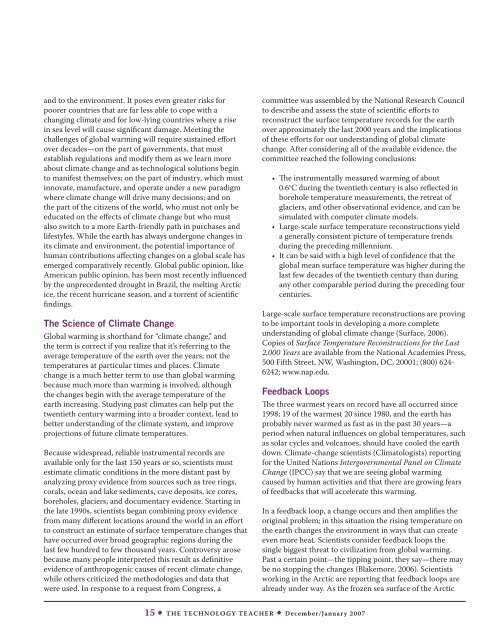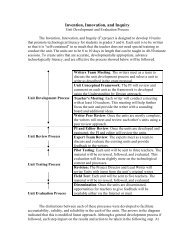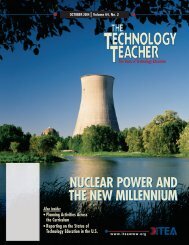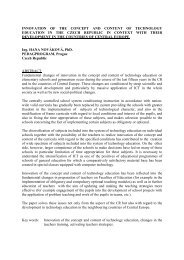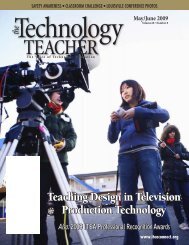Vol 66, No. 4 - International Technology and Engineering Educators ...
Vol 66, No. 4 - International Technology and Engineering Educators ...
Vol 66, No. 4 - International Technology and Engineering Educators ...
Create successful ePaper yourself
Turn your PDF publications into a flip-book with our unique Google optimized e-Paper software.
<strong>and</strong> to the environment. It poses even greater risks for<br />
poorer countries that are far less able to cope with a<br />
changing climate <strong>and</strong> for low-lying countries where a rise<br />
in sea level will cause significant damage. Meeting the<br />
challenges of global warming will require sustained effort<br />
over decades—on the part of governments, that must<br />
establish regulations <strong>and</strong> modify them as we learn more<br />
about climate change <strong>and</strong> as technological solutions begin<br />
to manifest themselves; on the part of industry, which must<br />
innovate, manufacture, <strong>and</strong> operate under a new paradigm<br />
where climate change will drive many decisions; <strong>and</strong> on<br />
the part of the citizens of the world, who must not only be<br />
educated on the effects of climate change but who must<br />
also switch to a more Earth-friendly path in purchases <strong>and</strong><br />
lifestyles. While the earth has always undergone changes in<br />
its climate <strong>and</strong> environment, the potential importance of<br />
human contributions affecting changes on a global scale has<br />
emerged comparatively recently. Global public opinion, like<br />
American public opinion, has been most recently influenced<br />
by the unprecedented drought in Brazil, the melting Arctic<br />
ice, the recent hurricane season, <strong>and</strong> a torrent of scientific<br />
findings.<br />
The Science of Climate Change<br />
Global warming is shorth<strong>and</strong> for “climate change,” <strong>and</strong><br />
the term is correct if you realize that it’s referring to the<br />
average temperature of the earth over the years; not the<br />
temperatures at particular times <strong>and</strong> places. Climate<br />
change is a much better term to use than global warming<br />
because much more than warming is involved, although<br />
the changes begin with the average temperature of the<br />
earth increasing. Studying past climates can help put the<br />
twentieth century warming into a broader context, lead to<br />
better underst<strong>and</strong>ing of the climate system, <strong>and</strong> improve<br />
projections of future climate temperatures.<br />
Because widespread, reliable instrumental records are<br />
available only for the last 150 years or so, scientists must<br />
estimate climatic conditions in the more distant past by<br />
analyzing proxy evidence from sources such as tree rings,<br />
corals, ocean <strong>and</strong> lake sediments, cave deposits, ice cores,<br />
boreholes, glaciers, <strong>and</strong> documentary evidence. Starting in<br />
the late 1990s, scientists began combining proxy evidence<br />
from many different locations around the world in an effort<br />
to construct an estimate of surface temperature changes that<br />
have occurred over broad geographic regions during the<br />
last few hundred to few thous<strong>and</strong> years. Controversy arose<br />
because many people interpreted this result as definitive<br />
evidence of anthropogenic causes of recent climate change,<br />
while others criticized the methodologies <strong>and</strong> data that<br />
were used. In response to a request from Congress, a<br />
committee was assembled by the National Research Council<br />
to describe <strong>and</strong> assess the state of scientific efforts to<br />
reconstruct the surface temperature records for the earth<br />
over approximately the last 2000 years <strong>and</strong> the implications<br />
of these efforts for our underst<strong>and</strong>ing of global climate<br />
change. After considering all of the available evidence, the<br />
committee reached the following conclusions:<br />
• The instrumentally measured warming of about<br />
0.6°C during the twentieth century is also reflected in<br />
borehole temperature measurements, the retreat of<br />
glaciers, <strong>and</strong> other observational evidence, <strong>and</strong> can be<br />
simulated with computer climate models.<br />
• Large-scale surface temperature reconstructions yield<br />
a generally consistent picture of temperature trends<br />
during the preceding millennium.<br />
• It can be said with a high level of confidence that the<br />
global mean surface temperature was higher during the<br />
last few decades of the twentieth century than during<br />
any other comparable period during the preceding four<br />
centuries.<br />
Large-scale surface temperature reconstructions are proving<br />
to be important tools in developing a more complete<br />
underst<strong>and</strong>ing of global climate change (Surface, 2006).<br />
Copies of Surface Temperature Reconstructions for the Last<br />
2,000 Years are available from the National Academies Press,<br />
500 Fifth Street, NW, Washington, DC, 20001; (800) 624-<br />
6242; www.nap.edu.<br />
Feedback Loops<br />
The three warmest years on record have all occurred since<br />
1998; 19 of the warmest 20 since 1980, <strong>and</strong> the earth has<br />
probably never warmed as fast as in the past 30 years—a<br />
period when natural influences on global temperatures, such<br />
as solar cycles <strong>and</strong> volcanoes, should have cooled the earth<br />
down. Climate-change scientists (Climatologists) reporting<br />
for the United Nations Intergovernmental Panel on Climate<br />
Change (IPCC) say that we are seeing global warming<br />
caused by human activities <strong>and</strong> that there are growing fears<br />
of feedbacks that will accelerate this warming.<br />
In a feedback loop, a change occurs <strong>and</strong> then amplifies the<br />
original problem; in this situation the rising temperature on<br />
the earth changes the environment in ways that can create<br />
even more heat. Scientists consider feedback loops the<br />
single biggest threat to civilization from global warming.<br />
Past a certain point—the tipping point, they say—there may<br />
be no stopping the changes (Blakemore, 2006). Scientists<br />
working in the Arctic are reporting that feedback loops are<br />
already under way. As the frozen sea surface of the Arctic<br />
15 • The <strong>Technology</strong> Teacher • December/January 2007


